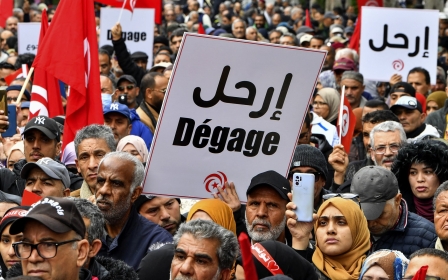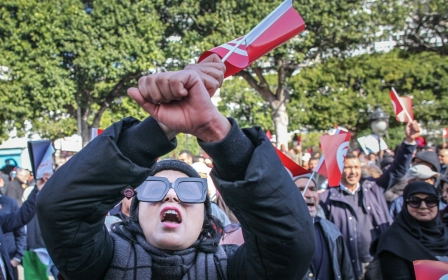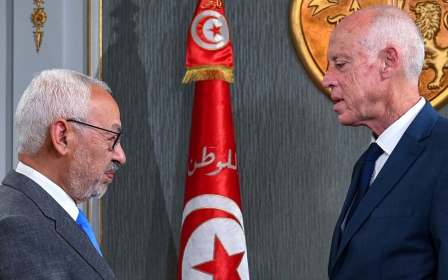Tunisia election: Why a stolen victory may seal Kais Saied's fate

A visitor to Tunisia these days might be forgiven for not realising that a presidential election is due to take place on Sunday, 6 October.
Gone are the mass rallies, the heated discussions on TV and radio, the poster-lined walls, the dozens of presidential hopefuls, the volunteers outside campaigning, the passionate debates online between supporters of different candidates and the general atmosphere of anticipation and excitement that marked successive elections between 2011 and 2019.
Kais Saied has ensured that Tunisia's upcoming election would be nothing like the ones that brought him to power in 2019, when he won 18.4 percent of the votes in the first round out of 26 candidates and 72.7 percent in the second round.
This is deeply ironic, given that he rose to prominence on a platform promising to achieve the goals of the Tunisian revolution.
Saied's 25 July 2021 coup against the democratic process that elevated him from a law professor with no political experience to the head of state has steadily dismantled that very process, consolidating his power despite his rapidly declining popularity.
New MEE newsletter: Jerusalem Dispatch
Sign up to get the latest insights and analysis on Israel-Palestine, alongside Turkey Unpacked and other MEE newsletters
It is no longer possible for Tunisians to watch live televised debates between presidential candidates, a rare sight in the region. During this debate, his revolutionary promises and dramatic ranting against normalisation with Israel won him many votes. Unsurprisingly, the ongoing genocide in Gaza has revealed those promises to be nothing but deception.
Five years since his election, support for Saied has evaporated with the illusion that he would achieve the hopes of the revolution. Instead, he dealt a fatal blow to Tunisia's fragile democratic transition.
Dismantling democracy
The president loves to declare his popular legitimacy in contrast to his critics, whom he brands as corrupt "traitors to the nation".
Saied has imprisoned his most prominent opponents from across the political spectrum, including my father, Rached Ghannouchi
However, he seems to be in no hurry to put his alleged popularity to the test. From his muzzling of the once-vibrant media to his draconian decrees criminalising any expression of dissent and imprisonment of ordinary citizens for even harmless social media posts, Saied has shown no tolerance for dissent.
He has imprisoned his most prominent opponents from across the political spectrum, including my father, Rached Ghannouchi, who served as the speaker of parliament. In 2019, Saied swore to uphold the constitution and the rule of law before this very parliament, only to later dissolve it and abolish the constitution - replacing them with his own versions.
While little sign of an ongoing election campaign could be seen on the country's walls and streets, the increased pace of arbitrary arrests reveals the regime's growing nervousness as the election date approaches.
Recent weeks have seen arrests of ordinary citizens for social media posts, campaigners for the leading opposition candidate and more than 100 members of the Ennahda party. Saied also detained the leading opposition candidate, Ayachi Zammel, throughout most of the election campaign and sentenced him to 12 years in prison.
The same sense of paranoia is reflected in the harsher restrictions recently imposed on access to lawyers, family visits and other conditions for existing political prisoners, such as my father.
Considering the dismantling of all democratic institutions since Saied's coup, the rapid shrinking of the political, media and civic space, the takeover of the electoral commission and the vagueness of the electoral law and election date itself, a surprisingly large number of Tunisians expressed their intention to run as candidates against Saied.
Perhaps less surprisingly, Saied made sure to exclude almost all of them, either by instructing his justice minister to prosecute them on one or more of the standard charges used against anyone who dares criticise or challenge Saied or by imprisoning them altogether.
Those who miraculously managed to fulfil the difficult candidacy conditions - including collecting over 10,000 citizen endorsements, a feat in the current atmosphere of fear, and avoiding being eliminated by Saied's judiciary - were excluded by his subservient electoral commission.
When they contested their exclusion and were reinstated by the administrative court, the electoral commission shockingly refused to comply.
Popular anger
Zammel was the final candidate to make it through the endless elimination race to appear on the ballot paper, only to be arrested and banned from voting for allegedly forging endorsements. Meanwhile, the courts ignored numerous claims of irregularities by another candidate - Saied himself.
Despite his imprisonment, Zammel remains on the ballot paper and has become the symbol of a growing campaign to mobilise votes against Saied.
However, Saied has made sure to close off all possible avenues for contesting the race by pushing his parliament to rush through a law to ensure Zammel or other excluded candidates cannot contest the election results through the administrative court. This was passed just 10 days before the election and has been met with widespread opposition across Tunisia's political and civil society.
Equally shocking has been the electoral board's refusal to accredit established election monitoring groups, accusing them of links to foreign entities and "suspicious foreign funding", another of Saied's favourite charges.
It goes without saying that there will be no foreign observers either, unlike previous post-revolution elections. The EU's response to those wondering whether it would send observers was simply that the authorities had not requested any, which is in line with the EU's policy of supporting Saied as long as he upholds promises to reduce migration to Europe at all costs.
Human rights violations, the dismantling of democratic institutions and rising unemployment and inflation can all be forgiven in return for guarding Europe's southern shores.
All of the above has led many to conclude that this election has lost any shred of credibility and that Saied is determined to do anything to ensure that it is no more than a formality to maintain his authoritarian rule and a chance to bolster his weakened legitimacy. This includes tampering with the results in the absence of an independent electoral commission, observers or an independent judiciary.
The election has served to further expose Saied's intolerance of any criticism and complete disregard for the rule of law
Others point to the renewed, and more diverse than previous years, mass protests on the streets of the capital in response to Saied's increasingly flagrant violations of every procedure and standard of fairness and transparency in organising the election.
They insist that mobilising to vote in the election, despite the irregularities and violations, could be one last chance to remove Saied through the ballot box or at least deprive him of an easy win without resorting to graver violations that would, in turn, spark further popular anger and mobilisation. Far from being free and fair, the election has served to further expose Saied's nervousness, lack of confidence in his own popularity, intolerance of any criticism and complete disregard for the rule of law.
Regardless of the merits and risks of the two positions, what is certain is that this election will not be the easy, legitimacy-bolstering win Saied had envisaged.
On the contrary, they seem to have renewed the hopes and determination of his widening circle of opponents, provoking recent protests and condemnations not only from his political rivals but also from journalists, judges, academics and civil society associations.
Together, they have finally recognised the need to end Saied's failed coup experiment, find a way out of Tunisia's multifaceted crisis and return to a functioning democracy that would respect the will of the people and prioritise solutions for their problems.
The views expressed in this article belong to the author and do not necessarily reflect the editorial policy of Middle East Eye.
Middle East Eye delivers independent and unrivalled coverage and analysis of the Middle East, North Africa and beyond. To learn more about republishing this content and the associated fees, please fill out this form. More about MEE can be found here.






